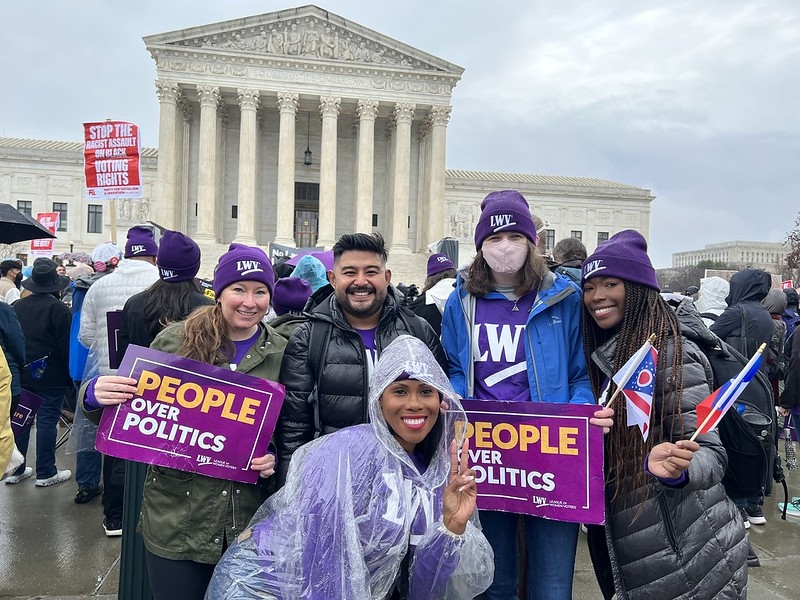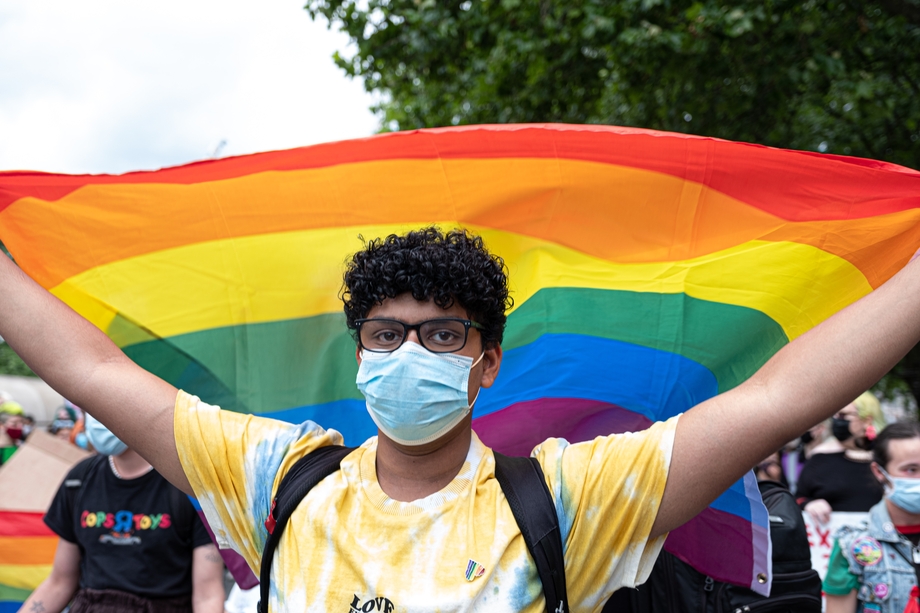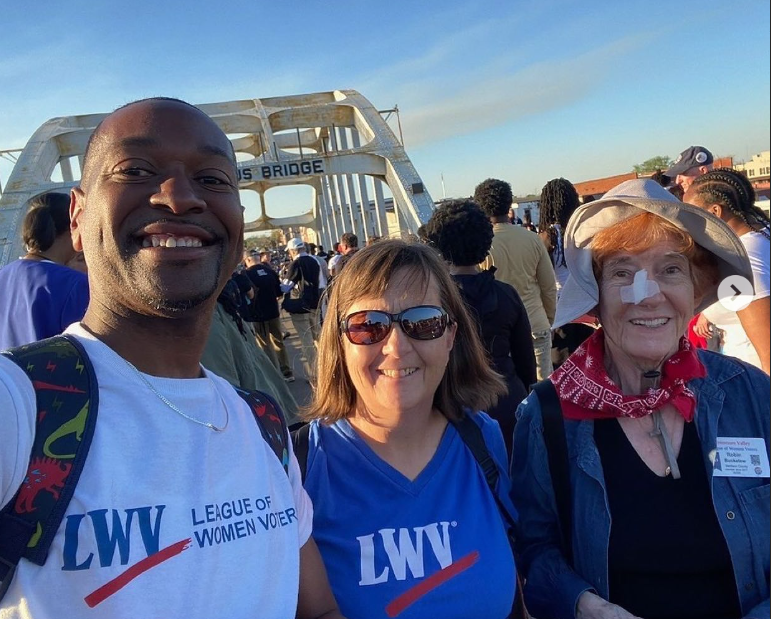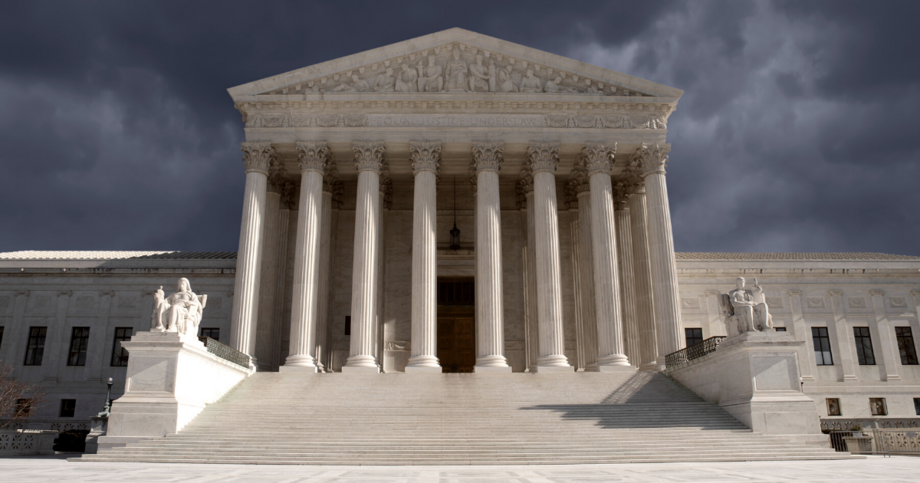During the 2022 Supreme Court term, the League of Women Voters filed amicus briefs in four cases: Moore v. Harper, Allen v. Milligan, Students for Fair Admissions v. Harvard, and 303 Creative, LLC v. Elenis.
In Moore v. Harper and Allen v. Milligan, two critical redistricting cases, the Court sided with the League’s position, rejecting the so-called “independent state legislature theory” and striking down Alabama’s racially discriminatory congressional maps under the Voting Rights Act of 1965, respectively. In doing so, the Court preserved vital checks on state legislatures and a critical tool for fighting racial discrimination.
Yet by holding that affirmative action policies in higher education are unconstitutional in Students for Fair Admissions v. Harvard and giving businesses greater freedom to refuse services to LGBTQIA+ customers in 303 Creative, LLC v. Elenis, the Court continued to retreat from applying the Constitution’s protections to historically disenfranchised and marginalized members of our society.
,
,
These decisions reveal a Court majority that, while unwilling to completely upend well-established checks and balances and protections against racial discrimination, continues to interpret the Constitution in a way that does not fully embrace remedying the disparities and injustices stemming from white supremacy.
Moore v. Harper
Summary of the Case
Moore v. Harper was one of, if not the most important, cases argued this term. It revolved around Article 1 Section 4 of the United States Constitution, also known as the ‘Elections Clause,’ which states,
"The Times, Places and Manner of holding Elections for Senators and Representatives, shall be prescribed in each State by the Legislature thereof; but the Congress may at any time by Law make or alter such Regulations, except as to the Places of ch[oo]sing Senators."
In other words, state legislatures decide how, where, and when their Senators and Representatives are elected.
The question at the heart of the case was whether “legislature” meant solely the legislative branch, as the North Carolina legislature argued, or the entire law-making process with its accompanying checks and balances, which had been the accepted definition for decades.
,

,
After the North Carolina Supreme Court struck down gerrymandered congressional maps under the state constitution’s free and equal elections clause, among others, the North Carolina legislature appealed to the United States Supreme Court. They argued that under the Constitution’s Elections Clause, the North Carolina legislature had exclusive power to regulate federal elections under state law without any check by state courts applying state law. Some more extreme versions of this theory, known as the “independent state legislature theory” (ISLT), would allow legislatures to enact state laws on federal elections without the governor’s consent or judicial review, giving them absolute power over that area of state law.
In response, LWVUS — and Leagues representing all fifty states and the District of Columbia — filed an amicus brief urging the Court to reject ISLT. In the brief, the League pointed out that adopting the legislature’s position could invalidate hundreds of state court rulings on state law applying to federal and state elections. Furthermore, the League argued that adopting ISLT could create two very different sets of laws for federal and state elections, creating massive confusion for election officials and voters. For example, a state could enact two different election days for state and federal elections or create different voter ID requirements for federal and state elections. Dozens of amicus briefs were filed in the case, and the League participated in a rally on the day of oral argument.
The Court’s Opinion and the Consequences
In a 6-3 ruling authored by Chief Justice John Roberts, the Court rejected the ISLT. The majority opinion decisively reaffirmed the principle of state court judicial review, stating, “[t]he Elections Clause does not insulate state legislatures from the ordinary exercise of state judicial review.” Chief Justice Roberts also made favorable references to the constitutionality of independent state redistricting commissions, which he had previously opposed.
,
Support our litigation defending the freedom to vote across the US!
,
But the opinion contained a caveat giving federal courts a role in interpreting state court decisions on state law, stating “federal courts must not abandon their duty to exercise judicial review. In interpreting state law in this area, state courts may not exceed the bounds of ordinary judicial review as to unconstitutionally intrude upon the role specifically reserved to state legislatures by Article I, Section 4, of the Federal Constitution.” The implications of this part of the opinion remain unclear.
Despite this, Moore v. Harper is a vital victory for the freedom to vote. State courts and constitutions have increasingly become the chief protectors and last refuges of voting rights. Had the North Carolina legislature prevailed, gerrymandered state legislatures around the country would have been free to rig congressional districts and elections for their favored party at will with no recourse but Congress. State election laws would also have been chaotic, with legislatures passing two different sets of laws for state and federal elections, a nightmare for voters and election officials. State court decisions protecting voting rights in federal and state elections could have been overturned, endangering the freedom to vote for millions. Moore v. Harper ensures that state courts, state law, and state constitutions remain a viable check on legislatures intent on suppressing voting rights in federal elections.
303 Creative, LLC v. Elenis
Summary of the Case
Plaintiff Lori Smith, owner of 303 Creative, LLC, a Colorado-based graphic and web design company, filed a lawsuit alleging that two provisions of the Colorado Anti-Discrimination Act (CADA), which forbid both communications that customers were unwelcome because of their sexual orientation and the refusal of service for the same, violated her First Amendment rights of free exercise and free speech.
,

,
Ms. Smith claimed that she planned to expand her business by building unique, tailored wedding websites for couples but refused to create any celebrating same-sex marriages, citing her religious beliefs. Before bringing the lawsuit, she had built zero websites, expressing concern that she would incur civil penalties and fines under CADA.
LWVUS, together with the National Women’s Law Center and 34 other organizations, filed an amicus brief supporting Colorado and the constitutionality of the CADA provisions. The League and its partners emphasized the vital importance of public accommodation laws in protecting women and members of the LGBTQIA+ community from discrimination. The brief also warned that allowing free speech exceptions to anti-discrimination laws could undermine other anti-discrimination laws and, taken to their maximum extent, would allow any business owner who dislikes a certain group to refuse to serve them.
Opinion of the Court and its Consequences
In a 6-3 ruling, with all three liberal justices in dissent, the Court ruled that the state couldn’t require Ms. Smith to create websites celebrating same-sex weddings. The justices were sharply divided on the reach and effect of the decision.
,
,
The majority opinion stated that Ms. Smith’s websites constituted expressive content — content that was personal to her. Given the content’s expressive nature, the state could not require Ms. Smith to create versions celebrating same-sex marriages without violating her First Amendment right to free speech. In the majority’s view, this would constitute the government forcing a plaintiff to express speech that contradicted her religious beliefs — namely, that marriage is between one man and one woman.
Writing for the majority, Justice Gorsuch described the opinion as being limited to preventing Colorado from compelling Ms. Smith to create and express content that violated her sincerely held religious beliefs. Under this interpretation, public accommodation laws preventing discrimination based on sexual orientation in non-expressive business conduct, like selling groceries, were unaffected.
By contrast, the dissent, led by Justice Sotomayor, framed the decision as far more sweeping and dangerous. In the dissenters’ view, the majority had granted Ms. Smith a license to discriminate based on her customers’ sexual orientation on First Amendment grounds by allowing her to deny same-sex couples website design services and post a message explicitly denying LGBTQIA+ customers. For the dissenting Justices, Ms. Smith’s challenge to CADA paralleled attempts by segregationist business owners who claimed their rights to free speech and religious freedom exempted them from racially integrating their business and providing equal services to all customers regardless of race.
,

,
Given the widely diverging interpretations of this ruling by the majority and dissent, the effect of this ruling is unclear. This decision will doubtless be used by many business owners seeking to deny services to groups they disfavor. Whether courts permit them to do so in a wide variety of services and businesses beyond the creation of wedding websites remains to be seen.
Allen v. Milligan
Summary of the Case
In 2021, Alabama enacted a congressional map with seven districts, only one of which allowed Black voters to elect a candidate of their choice.
According to the 2020 Census, Alabama’s population is approximately 64% white and 25% Black. The 2021 map divided the Black Belt, a historically disenfranchised rural region with a majority Black population, between multiple majority-white congressional districts.
Several lawsuits were filed, asserting the new districts violated Section 2 of the Voting Rights Act by preventing Black voters from electing candidates of their choice. A three-judge panel, two of whom were nominated by former President Trump, ruled that the maps violated the Voting Rights Act. Alabama then appealed to the Supreme Court, arguing that in evaluating Section 2 claims for redistricting maps, a court should no longer consider race and instead should impose a test that would effectively make it impossible for voters of color to challenge racial vote dilution in redistricting.
Tell Your Representatives to Restore the Voting Rights Act
This proposal would have replaced a test used by courts for decades in challenges to redistricting maps; the test applied several race-conscious factors to a jurisdiction, including whether there is racially polarized voting in the district, the political cohesion of voters of color, and an additional multi-factor test as to whether the political system at issue is equally open to voters of color. As it stands, this test is a difficult burden for plaintiffs to meet.
LWVUS, LWV Alabama, and local partner Stand-Up Mobile filed an amicus brief supporting the plaintiffs, arguing that the city of Mobile and the Black Belt region of Alabama constitute a distinct community of interest that should be combined into a Black-majority district. The brief emphasized that the Black communities in Mobile and the Black Belt share a history of migration and common interests stemming from poverty and underinvestment in health, education, and food insecurity, needs that have been repeatedly ignored due to the division of this community over decades of redistricting.
The Court’s Opinion and the Consequences
In a 5-4 decision, with Chief Justice Roberts and Justice Kavanaugh providing the decisive votes, the Court upheld Section 2 of the Voting Rights Act, refusing to adopt Alabama’s proposed “race-neutral benchmark” test.
,

,
Fundamentally, the Court’s opinion ensures that Section 2 remains a viable tool to challenge redistricting maps that fail to give voters of color an equal opportunity to elect candidates of choice. The decision has impacted similar lawsuits in Louisiana, Georgia, and elsewhere seeking to challenge redistricting maps that fail to provide equal opportunities for Black voters to elect candidates of choice.
Despite this decision, Section 2 is still under threat. In his concurrence, Justice Kavanaugh hinted at a potential avenue for attacking the voting rights law, stating, “the authority to conduct race-based redistricting cannot extend indefinitely into the future.”
The state of Alabama saw this as an opening to keep trying to eliminate Section 2 of the Voting Rights Act. Instead of complying with the Court’s order, Alabama refused to draw a second majority-Black congressional district, submitting a new map with only one Black-majority district to the three-judge district court panel. The three-judge panel rejected the map and appointed an expert to draw one compliant with the Supreme Court’s order. Alabama again appealed to the Supreme Court, seeking to violate the Voting Rights Act once more, ignore its Black residents, and avoid drawing a second-majority Black district. The Court has yet to issue a decision on this renewed appeal.
,
,
The Voting Rights Act and the rights it protects cannot be truly secure until there are laws and elected officials at all levels of government committed to defending voting rights. The freedom of millions of Americans to choose their representatives should not hinge on whether five judges believe such freedoms deserve protection. Along with voting for candidates who protect and defend the right to vote, passing the John R. Lewis Voting Rights Advancement Act and similar legislation is vital to securing the foundations of multi-racial American democracy.
Students for Fair Admissions v. Harvard (consolidated with Students for Fair Admissions v. University of North Carolina)
Summary of the Case
The Court consolidated and heard two lawsuits brought against Harvard and the University of North Carolina by Students for Fair Admissions (SFFA), an anti-affirmative action group.
Both institutions’ admissions policies incorporated race as one factor among many to create a diverse student body, a policy known as affirmative action. Affirmative action began to correct the wide disparities created by centuries of official and unofficial policies excluding Black people and other people of color from government contracting, employment, education, and other opportunities.
,

,
SFFA argued the institutions’ policies violated the Equal Protection Clause of the Fourteenth Amendment, which applied to these universities due to their acceptance of federal government funding.
LWVUS and 36 other pro-equality organizations filed an amicus brief led by the National Women’s Law Center urging the Court to uphold affirmative action in higher education admissions policies. The League and its co-amici pointed to the benefits affirmative action brought to college campuses, such as including women and people of color in diverse student bodies. In particular, the brief explained that exposure to diverse groups would break down harmful stereotypes, prepare students to participate in a diverse society, and foster the exchange of ideas.
The Court’s Decision & Its Consequences
In a 6-3 decision, with all liberal Justices in dissent, the Court sided with SFFA, ruling that using race as a factor in college admissions violated the Equal Protection Clause. Justifying its decision, the majority wrote that the universities’ race-conscious admissions policies offered no measurable standard to determine whether the institutions’ cited interests were being advanced through affirmative action, failed to connect with their stated goals meaningfully, and had no set end date.
The majority left a narrow path, allowing the mention of applicants’ race, stating:
"[N]othing in this opinion should be construed as prohibiting universities from considering an applicant’s discussion of how race affected his or her life, be it through discrimination, inspiration, or otherwise... A benefit to a student who overcame racial discrimination, for example, must be tied to that student’s courage and determination. Or a benefit to a student whose heritage or culture motivated him or her to assume a leadership role or attain a particular goal must be tied to that student’s unique ability to contribute to the university. In other words, the student must be treated based on his or her experiences as an individual—not on the basis of race."
How universities — and courts — will apply this rule going forward remains to be seen.
,

,
By striking down affirmative action in higher education admissions, the Court’s six conservative majority made clear that they do not like to view law, or the Constitution’s protections, in a race-conscious way.
This decision’s impact is not limited to college admissions. This opinion could also limit the reach of government programs working to serve communities of color. As a result of centuries of governmental policies preventing the full economic and political participation of people of color in American life, communities of color are disproportionately represented in the most underserved segments of our society. The resulting disparities persist in every part of American life, such as education, housing, income, career advancement, political power, involvement with the criminal legal system, and health. Programs like affirmative action, which aim to remedy the effects of systemic racism, may not pass muster under this Court.
This does not mean that private institutions and government should abandon their efforts to ensure greater diversity and remedy the effects of racist policies. On the contrary, outreach efforts must be redoubled to incorporate people of color and historically disenfranchised communities. The ruling is a blow to remedying the effects of almost two and half centuries of institutionalized racism in the United States, but it does not foreclose all efforts to do so.
The Supreme Court begins its 2023 term on October 2, 2023. LWVUS is already watching cases on the Court’s docket. Check our blogs for a preview of the upcoming term!